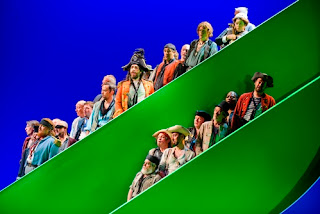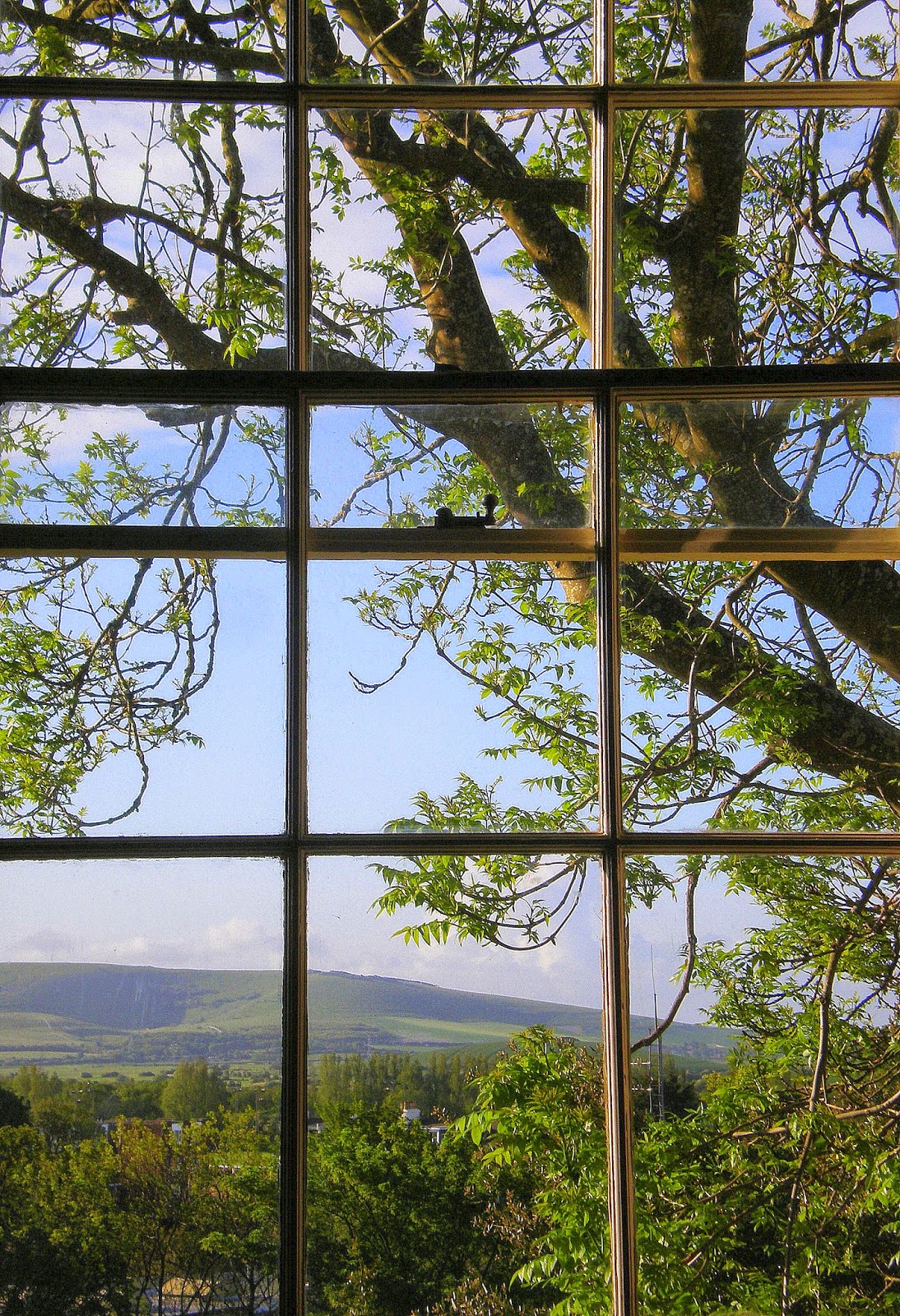Tussock time, as in leaping from one pleasure to another, truly began the Friday before last with the annual Europe Day Concert in St John's Smith Square and continued on Sunday and Monday at Glyndebourne. 150th birthday boy Richard Strauss was central to both: for the
Rosenkavalier Study Day, obviously, in anticipation of Richard Jones's production opening this afternoon - can't wait - and in the truly surprising component of the European Union Youth Orchestra's yearly marriage with singers from the European Opera Centre (official credit to the European Commission for the concert photos).
I can claim some credit for that, since I advised on the programme, marking the Greek Presidency of the European Union, and most of my Hellenic-themed suggestions were adopted. For practical reasons of orchestral size and the lack of a soprano to fit the Straussian bill, the closing scene from
Daphne wasn't possible - I'm still having the Haitink/Popp recording played at my funeral - but EUYO supremo Marshall Marcus did adopt the idea of the extraordinary interlude Strauss composed for his performing edition of Mozart's
Idomeneo. With only a fragment of Mozart, 'Torna la pace', at its heart, it's seismic and disturbing; my worries about where it might fit in a programme of plums were dispelled at the two-thirds mark, when gravity was required - how could one not think of Strauss looking back at the First World War, and of Ukraine today? - and the segue into Mozart's sublime Quartet, as good an ensemble as he ever wrote and the first great one in his oeuvre.
Vindicated, too, by my suggestion of conductor, the versatile Dominic Wheeler, who was as refined directing Monteverdi, Handel, Gluck, Purcell and Rameau from the harpsichord as he was spirited, yet still precise, in two fabulous Skalkottas dances and Vaughan Williams's Overture to
The Wasps (why some punters had a problem with its Englishness I don't understand. Relax, enjoy the generous melodies). Marshall took responsibility for the engaging spatial effects - Monteverdi brass from the gallery, La Musica advancing to the stage from the centre of the hall, the three orchestras of Rameau's
Dardanus Tambourins making for dazzling music theatre. It was his idea to end with the finale of Offenbach's
La belle Hélène, and the singers were so relaxed in conveying its comedy. After which we were happy and proud - at least I speak for myself - to stand for the European anthem, Beethoven's Ode to Joy.
Every year there's a revelation among the singers. Tara Erraught, Glyndebourne's Octavian,
stood out in 2009*; last year it was
young Viennese tenor Martin Piskorski. Here there were two stars in the making. Another Austrian, mezzo Sophie Rennert, is already the finished article, flawless and very moving in Dido's Lament - so she and Piskorski give Conchita Wurst a run for his/her money; Romanian soprano Monica Bancoș is a baby dramatic soprano, giving old-fashioned divadom to 'Divinités du Styx'. Milanese Elsa Galasio engaged as La Musica, while tenor Camille Tresmontant came into his own as Offenbach's Paris in shades. Wonderful at the end to see the young players embracing and kissing, just like they do in Lucerne.
A few shots from the aftershow drinks in the Footstall. Monica with my old friend, singer and pianist Tom Pope, and musical man about town Yehuda Shapiro (from now on the pics, except the one of Peter and Edward, are mine).
Monica and Elsa flanking Dominic Wheeler,
and Elsa and Sophie (a dead ringer for Martine McCutcheon, and a rather better singer).
Can't resist this official shot of the world's leading Ochs, our dear Peter Rose, talking to our equally dear Edward Mendelsohn.
And so from one group of promising young artists to another. I was quite excited to learn that soprano, comedienne and presenter Miranda Keys, whom I met when she was covering Jenufa and appeared at that Study Day, was not only singing Marianne the Duenna in
Rosenkavalier but also covering the Marschallin. On Sunday, in a day down in Sussex which started grey but turned out beautiful, she sang the Monologue and launched the trio, while two other covers sang Sophie - Louise Alder, stupendous, could go on now - and Octavian - Rihab Chaieb, lovely presence. Their pianist, Matt Fletcher, has just won the Kathleen Ferrier Accompanist's Prize, and brought down the trio from its climax with terrific artistry. Here he is with Miranda on the left and Rihab right (Louise had left by then to move house).

The magic of Glyndebourne never fails, and I was in seventh heaven entertaining, or so it seemed, a very responsive audience with different voice types in the main roles, from the Marschallin's creator Margarethe Siems up to Kiri, Frederica and Lucia (as good a Marschallin as a Sophie, possibly my favourite on disc in both roles). In the morning Raymond Holden set the scene and Mark Everist shed further fascinating light on the French operetta on which it turns out, courtesy of Count Harry Kessler's diaries, Hofmannsthal and Kessler had based the entire scenario.
A superb lunch in Nether Wallop - spicy meatballs, excellent - and chats with Cory Ellison, James Hancox, Lucy Lowe and above all the ever-supportive Christopher Cook, a consummate moderator, all added to the pleasure. Here's CC chatting to singers and accompanist in the Ebert Room.
There was time to spray the singers with my Jo Malone Red Roses cologne, and to dab them with the remains of my rose attar from Kashan. Then at the end the crowds suddenly vanished and, having given my bags to delightful BBC researcher Sinéad O'Neill
and her Strauss-knowledgeable partner Nicky to drop off at Pelham House Hotel in Lewes, I wandered the grounds before setting off over the hill to Lewes.
The lakeside, deserted until a couple with dogs appeared in the distance (Gus and Danielle?), had its special magic in mid-May.
The last of the tulips gave a splash of colour in the meadows above
and a lone peony flourished on the other side.
I had to pay homage to the bust of Sir George, who sadly died before the season's start; Gus wrote that he had been listening to Act 1 of Rosenkavalier in the 1965 Glyndebourne recording the night before his death. Brian Dickie has paid
eloquent tribute on The Arts Desk.
Then I inspected the flower beds in the formal garden - iris blooming
and incipient,
a fabulous flock of tulips
and others at the end of the long walk -
before I struck off up the field opposite to inquisitive stares from sheep and lambs.
I've always taken a higher route from the Lewes direction so never realised quite how beautiful this perspective on Glyndebourne and the Downs can be.
A gate at the end leads to the bare and glorious heights
from where, in a blasting wind, trees with raked shadows added features to the bare hills on the other side.
I confess I took a route the wrong side of the golf course and had some retracing of a valley to do
but it was worth it for the moon visible above the trees.
And then a quiet supper and sleep in wonderful Pelham House Hotel, to be greeted the next morning by more clarity from the bedroom window
and off on the 9.15 company bus to film back at the house. Frustrated that the bus filled up before Helene Schneiderman, the Annina who was such vivacious company in Dresden, and the Ochs, Lars Woldt, could get on. There was certainly a buzz outside the theatre before the pre-dress rehearsal, which had been opened to desperate friends and relations who hadn't got tickets. Sitting on a bench before the cameras in the formal garden dominated by the Henry Moore sculpture, I had a luxurious hour to chunter on to Sinéad for a luxurious 90 minute documentary, to be broadcast on BBC Four when it screens the opera on 24 June.
We'll see what they use, but I'm just so glad that with Tony Hall at the helm of the Beeb, the tide may have turned for decent coverage of the arts, and this doc is a real flagship example of good intentions. Coffee with the crew, another bus back to Lewes and back home to prepare the latest Poulenc
Carmelites class before pedalling to the City Lit for 4pm. And now a glorious weekend ahead at Glyndebourne: lucky, lucky.
*22/5 Only just found the right year, and this is what I wrote about her: 'Did you know his [Balfe's]
Falstaff? I certainly didn’t. (N)Annetta’s
cavatina is as good as your average Donizetti number; the Irish mezzo
despatched it with sparkling engagement of the audience and a musicality
to match Talbot’s'. She looks lovely both in the pictures of that occasion, when she was only 22 - I've closed in on the one of her animation in the
Carmen Quintet -
and, indeed, in a fashionplate photo that contradicts a certain journoass's latest piece of rubbish. I wouldn't link to it because I don't want anyone to read the rag in question. I can't stop my mother, but I can try not to feed an all-too visible troll and his paper.
As I've remarked in the comments below, few folk are coming out of Taragate, Dumpygate, call it what you will, with any credit. One treasurable phrase has emerged, applied by La Cieca of Parterre to a certain storm-stirrer: 'hit-whoring windbag'. 'Hit-whoring' will definitely enter my terminology.
Anyway, I've had enough now, just missed a radio summons which I would have resisted anyway, and only want to hear from those who've actually seen the Glyndebourne
Rosenkavalier. Which is marvellous: read my more or less uncontroversial, Jones-lovin'
Arts Desk review.



























































